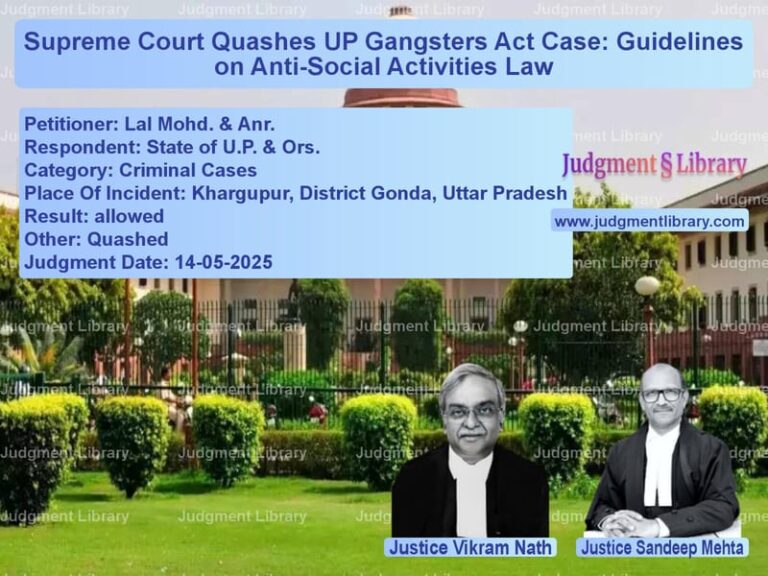Partition Dispute: Supreme Court Upholds High Court’s Order in Execution Case
The case of Renjith K.G. & Others vs. Sheeba pertains to a long-standing legal dispute over the execution of a final partition decree. The Supreme Court had to decide whether the execution petition filed decades after the final decree was barred by limitation and whether a third party to the decree could claim independent rights under Order XXI Rule 99 of the Civil Procedure Code (CPC).
Background of the Case
The appellants are the legal representatives of Padmakshy (deceased), who had initially filed a suit for partition and separate possession of 13 immovable properties in O.S. No. 38 of 1956 before the Sub Court, Parur. The court passed a preliminary decree on 23.10.1958, and after subsequent proceedings, a final decree was issued on 09.03.1970. The case was later transferred to the Additional District Court, Parur, where it was renumbered as O.S. No. 82 of 1960.
The dispute primarily revolved around item no. 4 of the partition schedule, measuring 1 acre 57 cents in Sy.No.120/10, located in Kodungallur Village, Kerala. The land originally belonged to Ayyappan, who mortgaged it twice before his death. Eventually, parts of the property were assigned to different individuals, leading to multiple ownership claims.
Key Legal Issues Considered
- Whether the execution petition filed in 1991, after the final decree of 1970, was barred by limitation under Article 136 of the Limitation Act.
- Whether Raghuthaman, the predecessor of the respondent, had an independent claim over the property.
- Whether a third party to the decree can file an application under Order XXI Rule 99 CPC to seek redelivery of possession.
Petitioner’s Arguments
The appellants, represented by legal counsel, argued:
- The predecessor of the respondents (Raghuthaman) had no independent title over the property.
- He was a pendente lite transferee, meaning he acquired rights in the property while the partition suit was still pending.
- The High Court wrongly relied on Chiranji Lal (D) by LRs. v. Hari Das (D) by LRs. (2005), which was not applicable.
- The execution petition could not be challenged by a third party who was not a party to the original decree.
Respondent’s Arguments
The respondent, Sheeba, countered:
- The execution petition was filed 21 years after the final decree, making it time-barred under Article 136 of the Limitation Act.
- The predecessor of the respondents, Raghuthaman, had valid ownership rights via an assignment deed dated 01.12.1964 (before the final decree was passed).
- Order XXI Rule 99 CPC allows third parties to seek relief if they have been wrongfully dispossessed.
- The High Court rightly set aside the execution order and remanded the case for fresh consideration.
Supreme Court’s Observations
1. Limitation Period for Execution of Decree
The Supreme Court cited Chiranji Lal v. Hari Das (2005), which established that:
“The period of limitation for execution of a partition decree starts from the date of the final decree, not from the date it is engrossed on stamp paper.”
Since the final decree was passed on 09.03.1970 and the execution petition was filed only on 13.03.1991, the Court held that the petition was barred by limitation.
2. Rights of a Pendente Lite Transferee
The Court ruled that:
“A pendente lite transferee, who was not impleaded in the original suit, can seek relief under Order XXI Rule 99 CPC if dispossessed.”
The respondent’s predecessor had obtained ownership before the final decree, meaning he had standing to file an application for re-delivery of possession.
3. Role of Execution Court
The Supreme Court highlighted the duty of the execution court:
“Once an application under Order XXI Rule 99 CPC is filed, it is the duty of the execution court to adjudicate all claims, including independent ownership rights, and determine rightful possession.”
4. Importance of Fair Trial
The Court criticized the lower courts for failing to recognize the rights of a third-party claimant. It reaffirmed that the execution court must conduct a detailed inquiry before evicting a party with a valid ownership claim.
Final Judgment
The Supreme Court:
- Upheld the High Court’s order that the execution petition was time-barred.
- Remanded the case to the trial court for fresh consideration.
- Allowed the respondent to raise independent ownership claims in execution proceedings.
Conclusion
The Supreme Court’s ruling in Renjith K.G. & Others vs. Sheeba reinforces the principle that execution petitions must be filed within the statutory limitation period. It also affirms the rights of third-party claimants in execution proceedings under Order XXI Rule 99 CPC. This case highlights the necessity of conducting proper legal inquiries before dispossessing individuals claiming legitimate ownership.
Petitioner Name: Renjith K.G. & Others.Respondent Name: Sheeba.Judgment By: Justice Pankaj Mithal, Justice R. Mahadevan.Place Of Incident: Kodungallur, Kerala.Judgment Date: 14-10-2024.
Don’t miss out on the full details! Download the complete judgment in PDF format below and gain valuable insights instantly!
Download Judgment: renjith-k.g.-&-other-vs-sheeba-supreme-court-of-india-judgment-dated-14-10-2024.pdf
Directly Download Judgment: Directly download this Judgment
See all petitions in Property Disputes
See all petitions in Specific Performance
See all petitions in Contract Disputes
See all petitions in Debt Recovery
See all petitions in Judgment by Pankaj Mithal
See all petitions in Judgment by R. Mahadevan
See all petitions in dismissed
See all petitions in Remanded
See all petitions in supreme court of India judgments October 2024
See all petitions in 2024 judgments
See all posts in Civil Cases Category
See all allowed petitions in Civil Cases Category
See all Dismissed petitions in Civil Cases Category
See all partially allowed petitions in Civil Cases Category







